Chicken Vegetable Soup Recipe
This chicken vegetable soup recipe is simply delicious, easy to make, and can be ready to eat in just a little over an hour.
Why is it that a bowl of chicken soup is like a big old comfy hug? In my opinion, the simpler the ingredients, the better when it comes to chicken soup recipes. Chicken and chicken broth can be somewhat neutral in flavor, so we want our ingredients to complement and not overshadow the flavors.
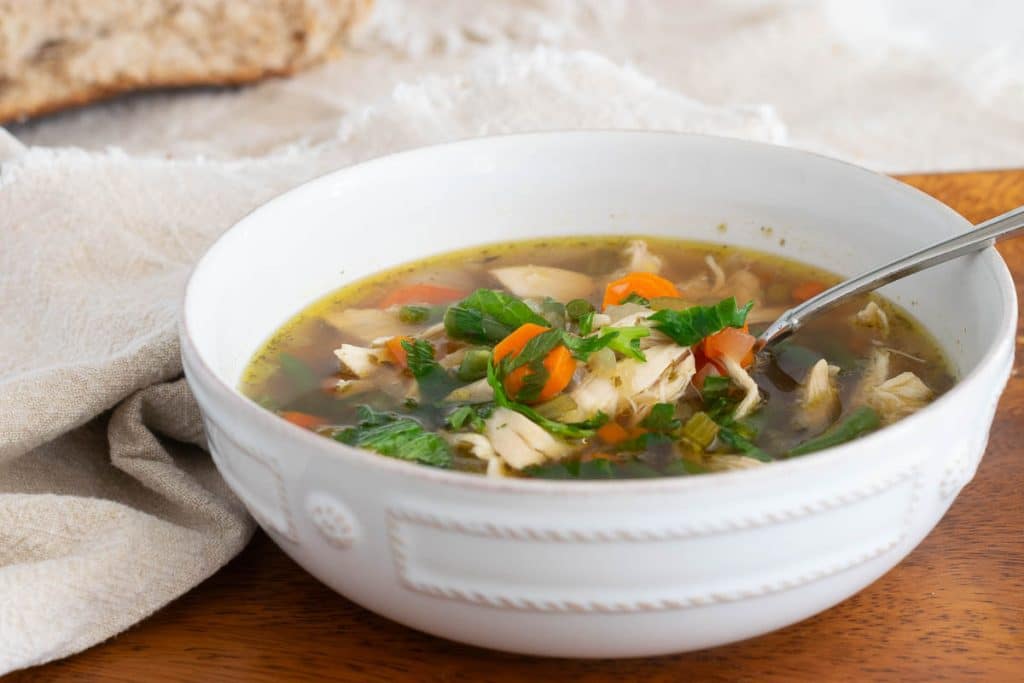
Table of Contents
As I said, I like to keep my chicken veggie soup rather uncomplicated and simple, with just the bare minimum ingredients. It was a stretch for me to even add the frozen green beans to the soup; I did it because my husband requested it. So, consider this recipe a jumping-off point for you; you’ll get a nice, flavorful broth chockful of chicken, carrots, celery, and onion. But, feel free to add in your favorite veggies before serving to make this soup just what your tastebuds are craving.
Ingredients in Homemade Chicken Vegetable Soup
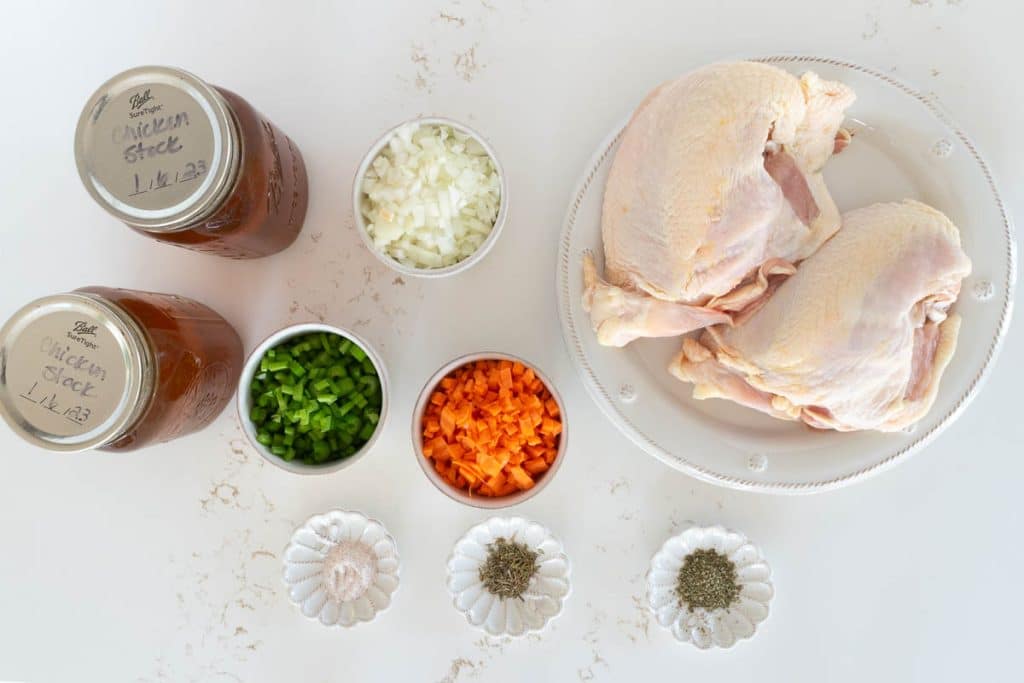
- Split Chicken Breasts with Skin and Bone: Bone-in, Skin-on breasts are awesome for adding more flavor to your soup. The bones and skin give it that extra oomph. But, if you’re in a pinch, boneless skinless chicken breasts and boneless skinless chicken thighs work too, but you might sacrifice a smidge of flavor. We’ll talk more about your chicken choices below.
- Olive Oil: Just enough to grease the bottom of the pan when we render the fat from the chicken skin.
- Chicken Broth: Opt for low sodium so you can control the salt level. Homemade is amazing if you’ve got it. Here’s my recipe for homemade chicken broth.
- Onion: Yellow onions are a good all-purpose choice. Want a sweeter vibe? Try a Vidalia.
- Carrots: No need to peel ’em unless you want to. The skin has nutrients, and we’re all about that goodness.
- Celery: Use the leaves too if you have ’em. They add extra flavor, and it’s like a mini garnish.
- Marjoram: This herb is a bit like oregano but milder. If you don’t have it, oregano can jump in as a sub. Just use a little less since it’s stronger.
- Thyme: Fresh or dried works. If you’ve got lemon thyme in your herb garden, that’s a zesty twist. If you are using fresh thyme, plan on three times as much as written in the recipe, so one and one-half teaspoons.
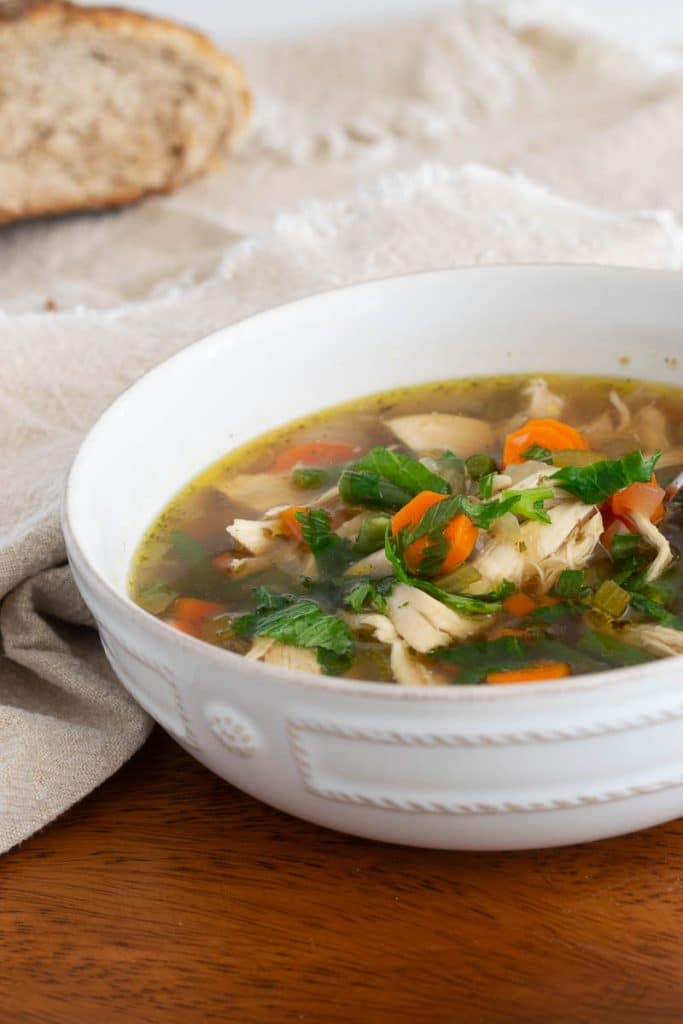
Talking About Chicken
This homemade chicken vegetable soup recipe takes advantage of the flavorful chicken fat in the skin and the bones to add extra oomph to the stock and soup.
When you cook with bone-in, skin-on chicken, you’re getting a deeper, richer chicken stock and meat. The bones release collagen and marrow goodness into the broth and meat, and the skin brings its own fatty richness. The meat usually ends up more tender and juicy when cooked bone-in; the bone is the ultimate meat tenderizer. It does take a bit longer to cook than boneless breasts, but it’s worth the wait in this case.
If you opt for boneless skinless chicken breasts, know that the meat and broth will be a bit more neutral. It will absorb the flavors from the broth and veggies, but they won’t add as much. Boneless, skinless breasts will be leaner, which sometimes translates to “drier” if you’re not careful with your cooking time. One benefit is that they are quicker to cook and easier to chop up for the soup, which could save you some time if you’re in a rush.
One other option is chicken thighs. As a darker meat, they pack a richer, more robust chicken flavor compared to breasts. And thighs are naturally juicier and more forgiving if you cook them a little too long. They stay tender, so they’re pretty much foolproof. Whether we are talking boneless skinless chicken thighs or bone-in, skin-on thighs, you’ll get more flavor than you will with chicken breasts. And thighs are typically a more economical cut of the chicken as well.
If you are REALLY short on time, you could use cooked rotisserie chicken. Just saute the vegetables in olive oil or butter, unless you have some chicken fat in your freezer! Then proceed with the recipe. Once again, your soup will lack that umami that comes from the rendered chicken fat and the meat cooked on the bone. But sometimes, we just need to get dinner on the table! I get it.
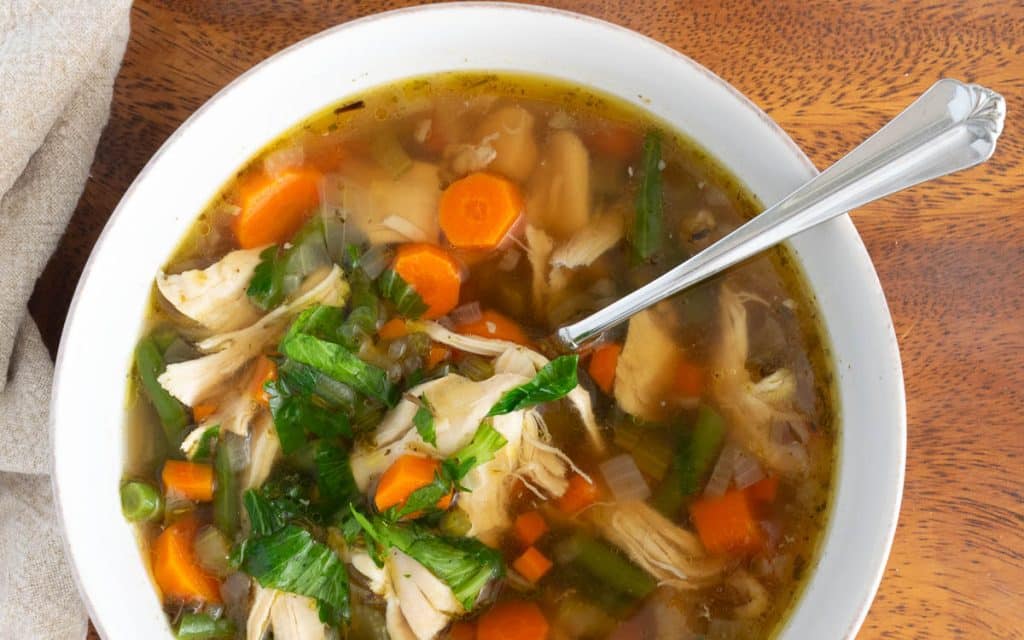
What Will You Add to Your Soup?
As I said, this recipe is a great jumping-off point to make this soup your very own. That’s the beauty of soup, isn’t it? Here are some suggestions to get you thinking:
- Fresh or frozen green beans: Fresh will need about 10 minutes to cook, while frozen will mostly just need to be warmed through
- Fresh or frozen corn: Fresh corn will need 4 minutes to cook, while the frozen will just need to be warmed through.
- Diced bell pepper
- Fresh or frozen peas will need 2-3 minutes to cook.
- Cubed potatoes will make your chicken vegetable soup heartier. The potatoes will need about 20-30 minutes to cook in the soup, so plan accordingly.
- Barley, rice, or even small pasta shapes will make this an even more filling soup. Just cook the grains separately and add them when serving to avoid them getting mushy. Add some noodles for a hearty bowl of chicken noodle soup!
- A handful of spinach or kale can add color and nutrients. Toss them in near the end so they stay vibrant.
- Add a can of diced tomatoes after you’ve sautéed your onions and celery but before you add your chicken and broth. Let them cook for 3-5 minutes before you add the chicken and broth. This allows the tomatoes to meld into the base flavors without overpowering the soup. Just a quick heads-up: the acidity from the tomatoes might break down veggies like potatoes a bit more than usual, so keep an eye on them.
- Not a fan of marjoram or thyme? Rosemary, sage, or even bay leaves can mix things up.
Storing Your Chicken Vegetable Soup
First, let the soup cool down to room temperature. Putting hot soup straight into the fridge can lower the overall fridge temp and mess with your other food. Pour your chicken soup into an airtight container. If you’re using glass, make sure it’s tempered so temperature changes won’t crack it. You’ll want to enjoy it within 3-4 days for max freshness and flavor.
If you are going to freeze your soup, again, let the soup cool before freezing. Then, portion it into individual servings or family-size batches. Freezer bags or souper cubes work well for this.
Food Storage Favorite
Some of these links may be Amazon affiliate links, and I may earn a small commission from the sale of these products to help defray the costs of operating this site. The price you are charged is not affected. You can see my full disclosure policy here.
I’ve been using Souper Cubes Freezer Storage Cubes and Pods for years! We use the 1 cup, 1/2 cup, and two tablespoon trays.
The 1 cup is perfect for lunch portions of soup, chili, and beans.
The 1/2-cup size is great for freezing buttermilk and cream. We also portion out 1/2-cup portions of our seasoned meat for our weekly nachos.
The 2-tablespoon trays are an excellent size for tomato paste and chipotle in adobo.
If you’re using freezer bags, lay them flat until they’re solid. Once they’re frozen, you can stack them to save space. Chicken vegetable soup can last up to 2-3 months in the freezer, but after that, it might lose some of its flavor. When you’re ready to enjoy the soup, the best way is to thaw it in the fridge overnight and then reheat it on the stove.
Note, that if you added pasta or rice, they can get mushy when stored. You might want to store them separately and add them when reheating.
And, if a fatty layer forms on top after refrigerating, don’t fret. You can either skim it off or stir it back in when reheating.
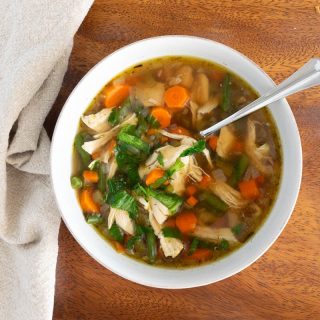
Chicken Vegetable Soup
Ingredients
- 2 Split Chicken Breasts bone-in, skin on (see note 1)
- 1 tablespoon of oil olive oil, canola oil, vegetable oil, or butter
- 1 medium onion diced
- 1 cup diced celery 3-4 stalks of celery
- 8 cups of chicken broth
- 1 cup of diced carrots 5-6 carrots plus more if you want to add them in later.
- 1/2 teaspoon salt
- 1/2 teaspoon marjoram
- 1/2 teaspoon thyme
- Pinch of black pepper
Instructions
- Drizzle oil in the bottom of a large soup pot and heat over medium heat.
- Add chicken breasts, skin side down, and cook for 5-10 minutes until chicken fat is rendered.
- Remove chicken from pot and set on a plate.
- Add onions and celery, scraping up any chicken bits on the bottom of the pot.
- Cook for 3-5 minutes until onions are translucent. Don't let them brown. You may need to turn your heat to low to keep them from browning.
- Return the chicken breasts to the pot, along with the carrots, chicken broth, marjoram, thyme, salt and pepper.
- Bring to a boil and simmer, uncovered, for about 30-40 minutes, until meat is just cooked through.
- Remove the chicken from the pot again and let it cool. Once it is cool, shred the chicken.
- While the chicken is cooling, add whatever veggies you would like to add to the pot. See note 2 for suggestions for additional veggies and their cooking times.
- Add the chicken back just before serving, just enough time to warm it. If you are adding any pasta and grains, add them now as well.
Notes
- Fresh or frozen green beans: Fresh will need about 10 minutes to cook, while frozen will mostly just need to be warmed through
- Fresh or frozen corn: Fresh corn will need 4 minutes to cook, while the frozen will just need to be warmed through.
- Diced bell pepper, will need about 2-3 minutes to cook.
- Fresh or frozen peas will need 2-3 minutes to cook.
- You can add larger rounds of carrots as well as the diced ones. Give them 5-10 minutes to cook.
- Cubed potatoes will make your chicken vegetable soup heartier. The potatoes will need about 20-30 minutes to cook in the soup, so plan accordingly.
- Barley, rice, or even small pasta shapes will make this an even more filling soup. Just cook the grains separately and add them when serving to avoid them getting mushy. Add some noodles for a hearty bowl of chicken noodle soup!
- A handful of spinach or kale can add color and nutrients. Toss them in near the end so they stay vibrant.
- Add a can of diced tomatoes after you’ve sautéed your onions and celery but before you add your chicken and broth. Let them cook for 3-5 minutes before you add the chicken and broth. This allows the tomatoes to meld into the base flavors without overpowering the soup. Just a quick heads-up: the acidity from the tomatoes might break down veggies like potatoes a bit more than usual, so keep an eye on them.
- Not a fan of marjoram or thyme? Rosemary, sage, or even bay leaves can mix things up.
Nutrition
Bookmark this page or pin the following image to return to this Chicken Vegetable Soup Recipe in the future.
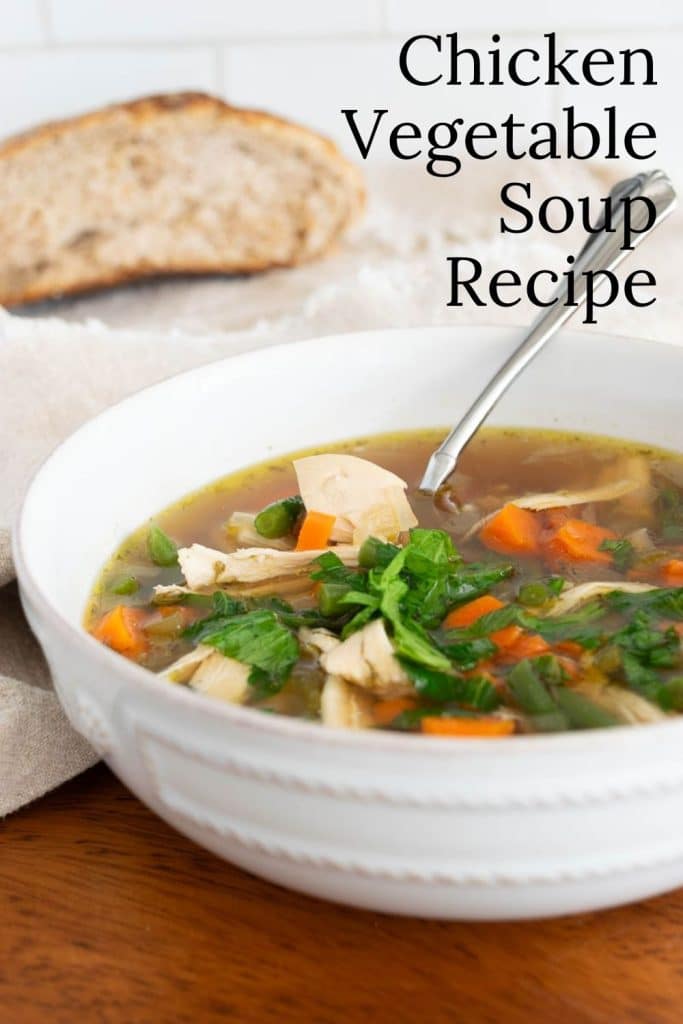
Thanks so much for spending a few minutes of your busy day with me!
To ensure you don’t miss future content, pop your email in the pale green box on the right or click here. I usually send one email weekly, so I won’t inundate your inbox. I’m sensitive to an overflowing email inbox!
We will only use your email address to send you emails, no more than 1-2 weekly. In addition, you will have access to my growing library of knit & crochet patterns and other printables. Check back often as this library will continue to grow. You can unsubscribe anytime by emailing me or clicking on the “unsubscribe” link at the bottom of all emails.
And you can access many of the products I refer to on my Nourish and Nestle Amazon Page. You can access it here.
So, if you’d like to participate in the ‘subscriber benefit’ action, simply subscribe to Nourish and Nestle here or use the form on the right sidebar. It’s slightly towards the top.
I have sent all my subscribers the link to the Subscriber Benefits Library. If you missed it or misplaced it, let me know.
Until next time…







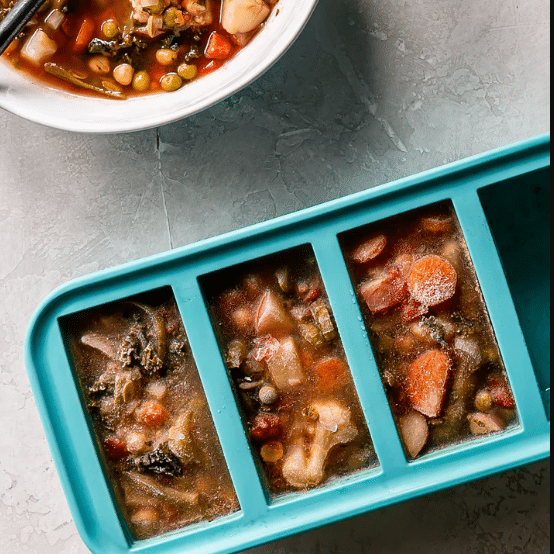
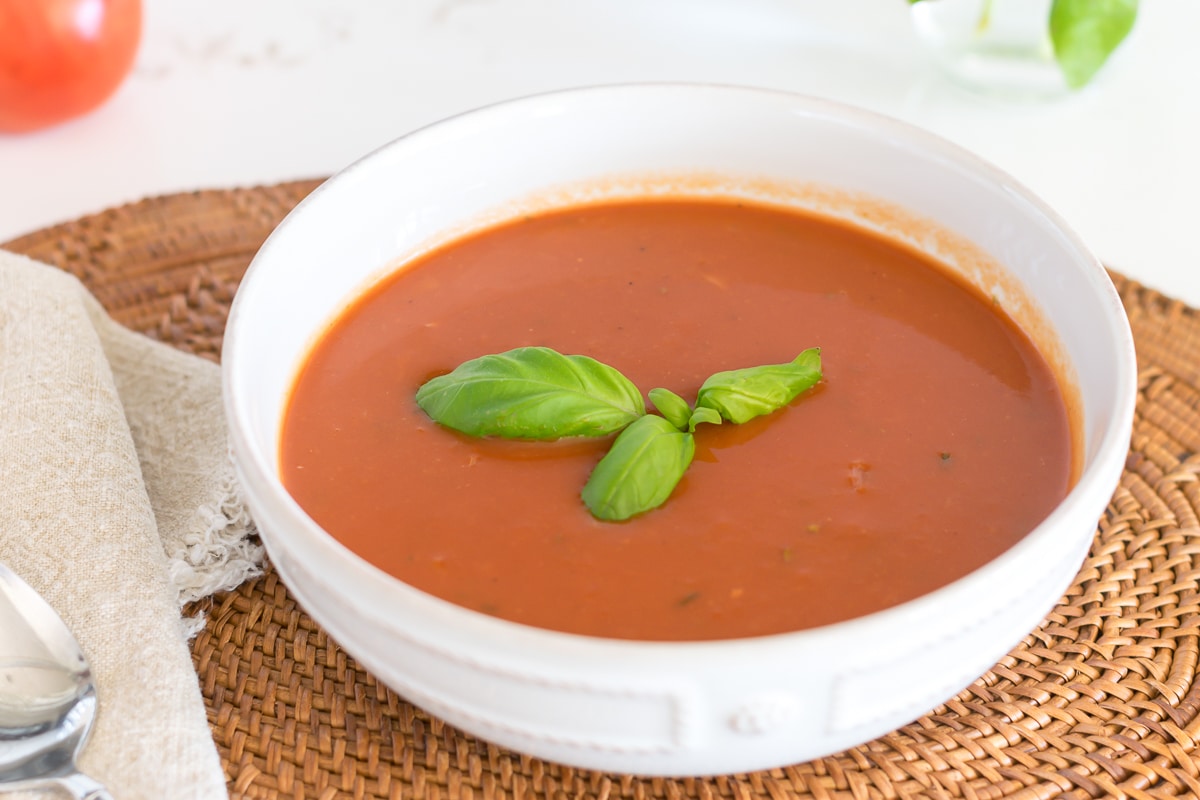
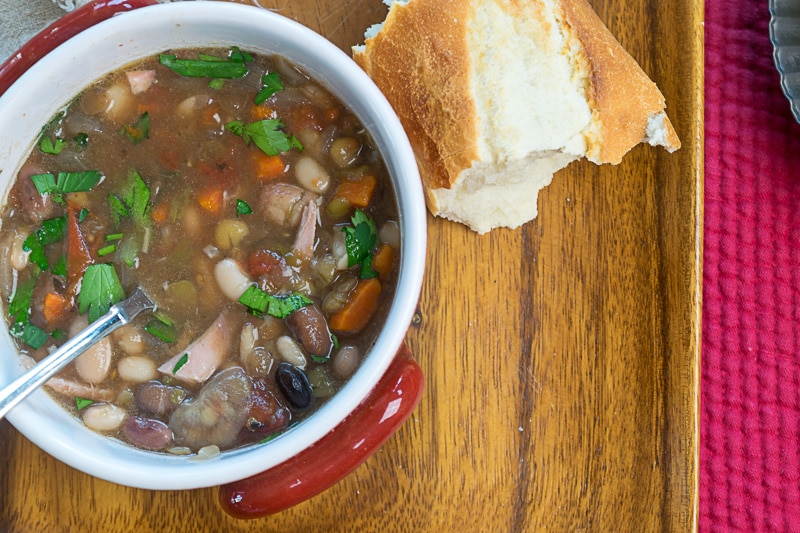
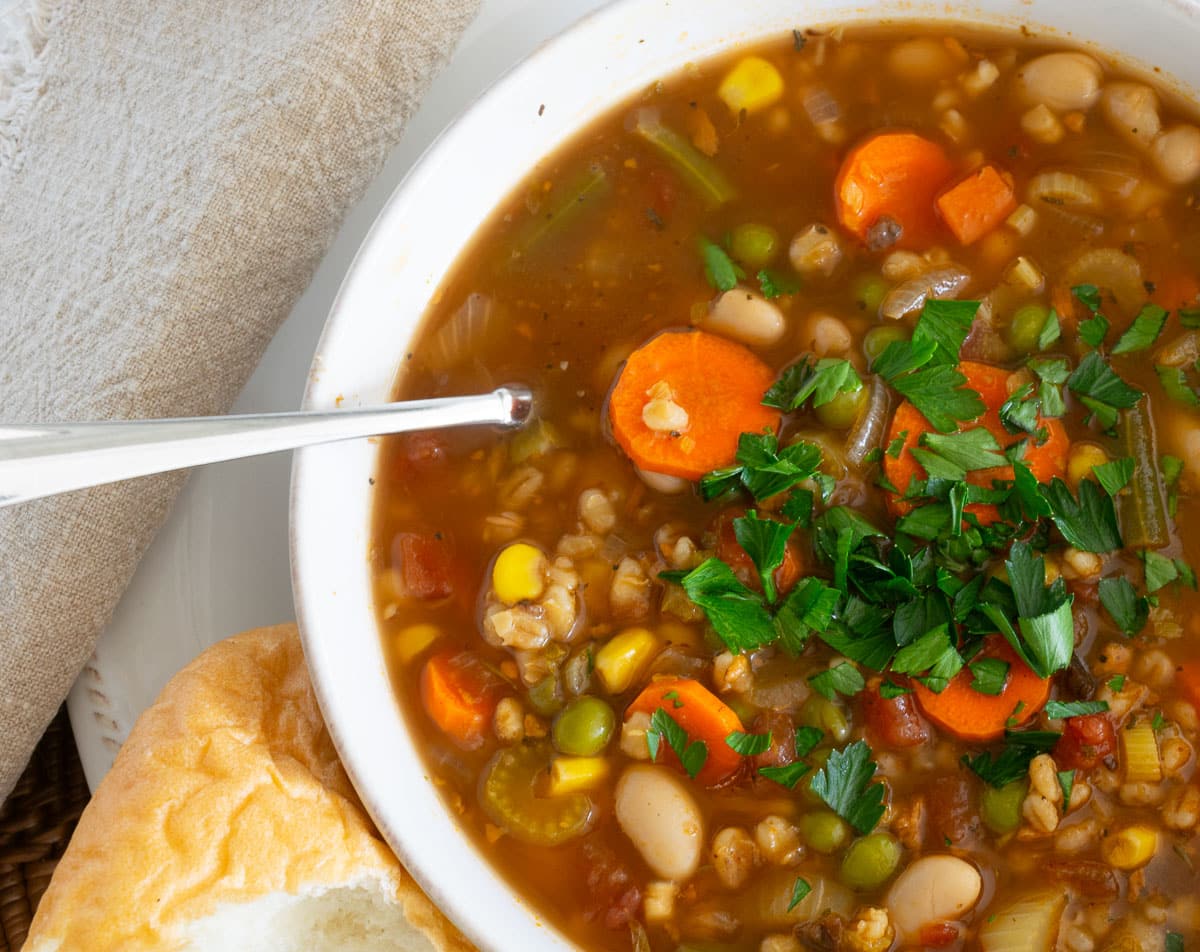
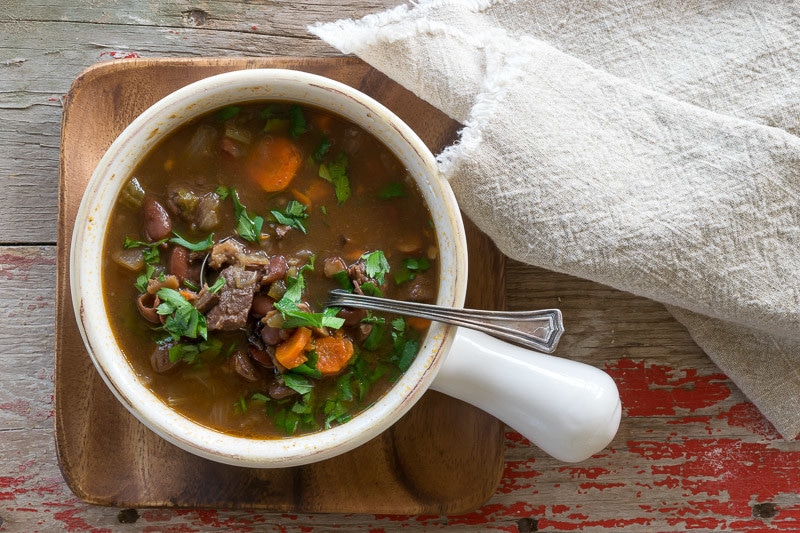
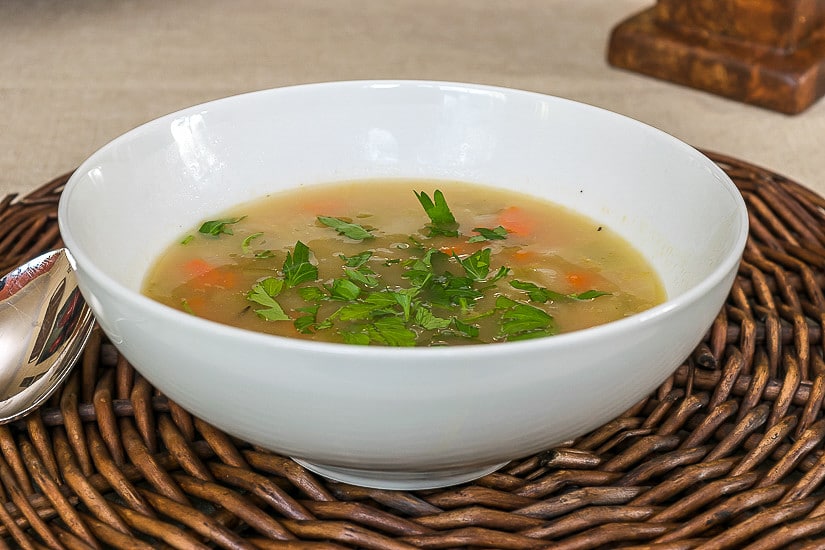
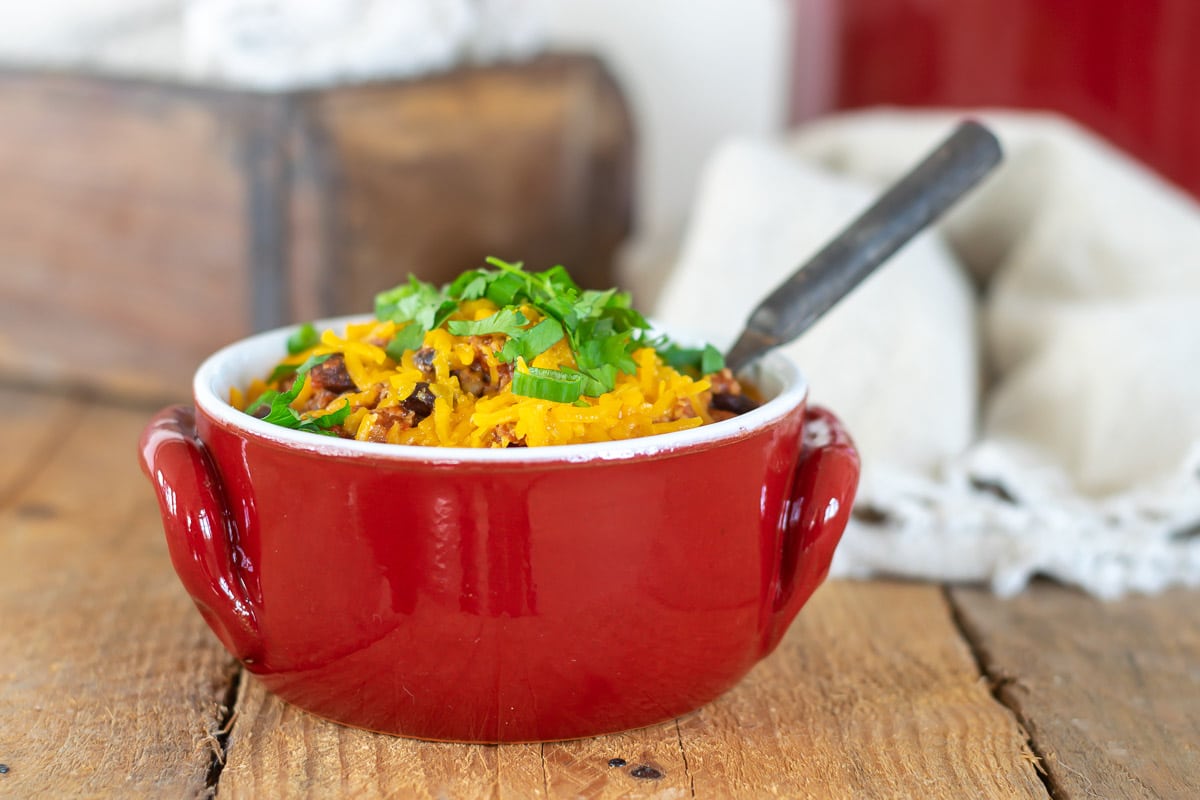
Hi Lynn. I recently found your site and love it!
I look forward to making the Grace baby blanket and the chicken veggie soup. The German’s Favoritesmedium box would be a wonderful pair for the soup, so please sign me up for the giveaway! 😉
Thank you for sharing your wealth of knowledge with those of us who are also homebodies and need to know what you know!!
Patti W
Hi Patti,
You’ll enjoy this relatively quick knit…it’s a sweet blanket.
You are officially entered in the drawing!
Thanks for being a subscriber to Nourish and Nestle.
Hugs, Lynn
This chicken soup looks divine. This will be great for Sunday dinner this weekend. I am also glad for world with Octobers. Take care.
Hi Connie,
I’m pretty sure you will enjoy this soup for Sunday dinner. And as is the case for all soups, it is so much better the next day! Enjoy!
Hugs, Lynn
Delicious only using chicken thighs, fresh carrots, celery, onion, and can tomatoes. After cooking I added the 4oz can cream corn like my daddy did
Ah! I wasn’t familiar with the can of creamed corn trick! Thanks for the suggestion, Jean.